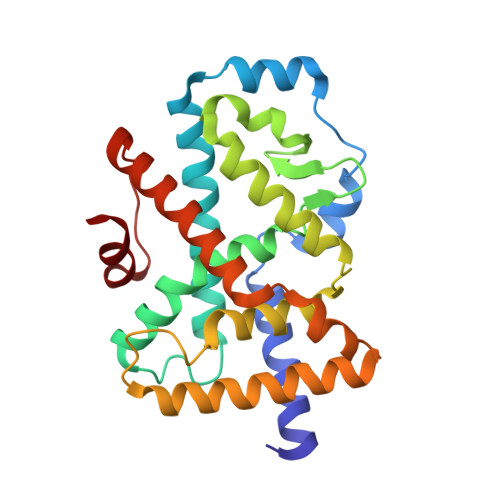Identification of an allosteric binding site for ROR gamma t inhibition.
Scheepstra, M., Leysen, S., van Almen, G.C., Miller, J.R., Piesvaux, J., Kutilek, V., van Eenennaam, H., Zhang, H., Barr, K., Nagpal, S., Soisson, S.M., Kornienko, M., Wiley, K., Elsen, N., Sharma, S., Correll, C.C., Trotter, B.W., van der Stelt, M., Oubrie, A., Ottmann, C., Parthasarathy, G., Brunsveld, L.(2015) Nat Commun 6: 8833-8833
- PubMed: 26640126
- DOI: https://doi.org/10.1038/ncomms9833
- Primary Citation of Related Structures:
4YPQ, 5C4O, 5C4S, 5C4T, 5C4U - PubMed Abstract:
RORγt is critical for the differentiation and proliferation of Th17 cells associated with several chronic autoimmune diseases. We report the discovery of a novel allosteric binding site on the nuclear receptor RORγt. Co-crystallization of the ligand binding domain (LBD) of RORγt with a series of small-molecule antagonists demonstrates occupancy of a previously unreported allosteric binding pocket. Binding at this non-canonical site induces an unprecedented conformational reorientation of helix 12 in the RORγt LBD, which blocks cofactor binding. The functional consequence of this allosteric ligand-mediated conformation is inhibition of function as evidenced by both biochemical and cellular studies. RORγt function is thus antagonized in a manner molecularly distinct from that of previously described orthosteric RORγt ligands. This brings forward an approach to target RORγt for the treatment of Th17-mediated autoimmune diseases. The elucidation of an unprecedented modality of pharmacological antagonism establishes a mechanism for modulation of nuclear receptors.
- Laboratory of Chemical Biology, Department of Biomedical Engineering and Institute of Complex Molecular Systems, Eindhoven University of Technology, PO Box 513, Eindhoven 5600MB, The Netherlands.
Organizational Affiliation:


















